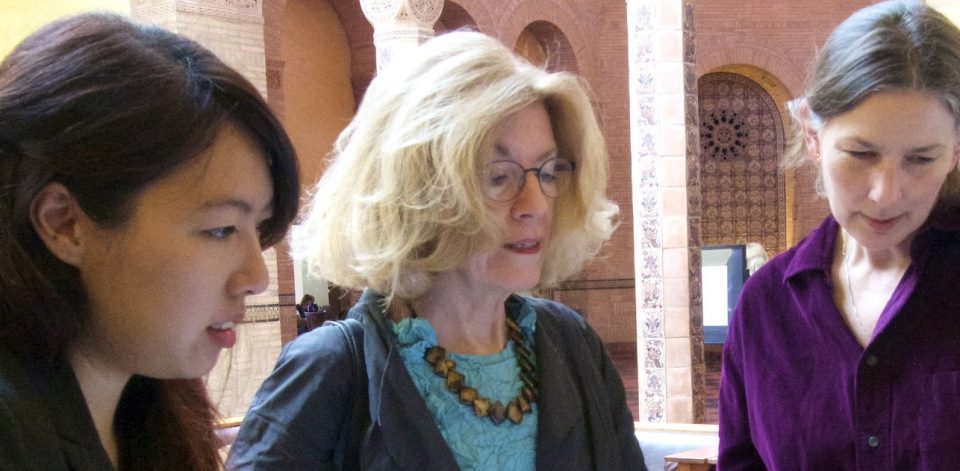
By CDH Guest Author on June 8, 2015
By Haley Di Pressi, Stephanie Gorman, Miriam Posner, Raphael Sasayama, and Tori Schmitt, with contributions from Roderic Crooks, Megan Driscoll, Amy Earhart, Spencer Keralis, Tiffany Naiman, and Todd Presner
UCLA’s Digital Humanities program emphasizes cross-disciplinary, cross-hierarchy collaboration among students, faculty, and staff. We’ve created this Student Collaborators’ Bill of Rights as a statement of our values and principles in the UCLA DH program.
Collaborations between students and more experienced digital humanities practitioners should benefit everyone. At their best, these partnerships are a way for students to learn new skills and benefit from mentorship, while more seasoned scholars can learn from junior scholars’ ideas, skills, subject knowledge, and perspectives.
It’s important, though, to recognize that students and more senior scholars don’t operate from positions of equal power in the academic hierarchy. In particular, students’ DH mentors may be the same people who give them grades, recommend them for jobs, and hold other kinds of power over their futures. Students may not feel entirely comfortable raising objections to certain practices if they feel these objections could endanger their academic or career prospects. Thus, we think it’s important to outline some best practices for collaborations with students on digital humanities projects, so that everyone involved feels they gain from the partnership.
Collaboration can take many forms, from casual brainstorming to full-time employment. As collaborations develop, senior scholars should be mindful that different kinds of relationships entail different responsibilities on the part of each collaborator. A professor who assigns a class project, for example, must primarily consider the student’s own intellectual growth, while a senior scholar who employs a student assistant may assign work that primarily benefits the project.¹
We endorse the principles outlined in the Collaborators’ Bill of Rights (2011). As additional safeguards for students, we advise those embarking on collaborations with students to adhere to the following principles:
- As a general principle, a student must be paid for his or her time if he or she is not empowered to make critical decisions about the intellectual design of a project or a portion of a project (and credited accordingly). Students should not perform mechanical labor, such as data-entry or scanning, without pay.
- Course credit is generally not sufficient “payment” for students’ time, since courses are designed to provide students with learning experiences.
- We encourage senior scholars to familiarize themselves with the literature on unpaid internships.² At a minimum, internships for course credit should be offered as learning experiences, with a high level of mentorship. Those employing interns should be prepared to spend substantial face-to-face time with the student.
- If students have made substantive (i.e., non-mechanical) contributions to the project, their names should appear on the project as collaborators, and they should be acknowledged in subsequent publications that stem from the project.
- Students should be empowered to present on projects on which they have collaborated (assuming reasonable limitations about sensitive and embargoed material and on work in progress). Students and senior scholars should discuss the protocol for such presentations at the outset of the project.
- Students should be empowered to list their collaboration on a project on a CV or résumé, with an appropriate degree of credit. Senior scholars should explicitly encourage this and help students to formulate meaningful statements about their contributions.
- Senior scholars should recognize that projects on which students have collaborated represent important components of students’ scholarly portfolios. Senior scholars should thus make every reasonable effort to either sustain a “live” project or, failing this, either transfer its ownership to student collaborators or distribute to students an archived version or snapshot of the project.
- When digital humanities projects are required for course credit, instructors should recognize that students may have good reasons not to engage in public-facing scholarship, or may not want their names made public, and should offer students the option of alternative assignments.
- In meetings and project communication, student collaborators should be treated as full members of the project team, to the extent that this is reasonable, and their contributions should be valued and respected. Students should have a clear sense of how their work fits into the larger project.
- Digital projects can sometimes branch into multiple projects, or head in multiple directions. Many digital projects are experimental. Mentors and students should set guidelines for re-use of digital scholarly material, as well as for maintaining meaningful artifacts of students’ contributions.
1. For more on these roles and the various responsibilities they entail, see Spencer Keralis, “Disrupting Labor in the Digital Humanities; or, The Classroom is Not Your Crowd,” in Disrupting Digital Humanities, ed. Jesse Stommel and Dorothy Kim (Punctum Books, 2015 [forthcoming]).
2. See, for example, ProPublica’s reporting on unpaid internships.
